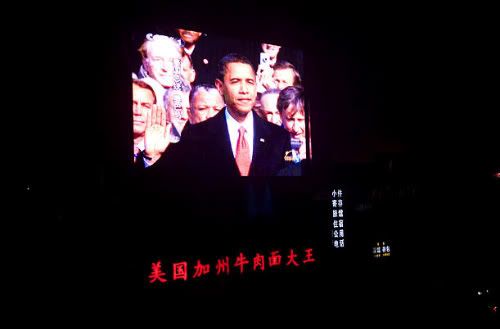Part of the Guest Bloggers Series
On an icy day in January, a new President in the United States took the oath of office with soaring words of hope, idealism and courage. At a time of the worst global recession in living memory and a multitude of challenges, he did not shrink from reality but embraced the capacity to change it. Those who heard him were lifted.

Speaking to the millions in America, but heard by billions around the world, President Barack Obama said:
“What the cynics fail to understand is that the ground has shifted beneath them – that the stale political arguments that have consumed us for so long no longer apply.”
Obama spoke of America, but he could have been speaking of the world. We are everywhere in need of renewal and hope. None more so than on the climate challenge where we need fresh vision and a politics that looks forwards not backwards. The stakes are so high that anything less than an audacious, global effort to reconcile our differences and make peace with the planet will fail humanity. We will not regret it in our parochial nationalisms as Indians or Americans, but as humans – as a species that failed itself, and condemned the rest.
This is why 2009 matters and why this year’s UN Conference on Climate Change (COP15) in Copenhagen in December must not fail.
COP15 – the fifteenth ‘Conference of Parties’, or member states, to have met to discuss the UN Framework Convention on Climate Change (UNFCCC) – will this year decide on a new global agreement to tackle climate change. This is the most momentous decision since the last such effort ended in the Kyoto Protocol in 1997.
COP15 will be far, far more significant coming as it does at a time when the science is – in Senator Kerry’s words – screaming at us for action. It will also be the first attempt to craft a truly global agreement bringing in emerging markets such as China and India into the search for solutions.

Which way will America – the traditional delinquent on climate change – turn?
Across America, the winds of change are blowing. The President has listened to a people hungry for action on climate change. He brings not only the capacity to change, but the willingness to change. For those who have longed for American to re-emerge from the shadows and exert decisive political leadership, the time is now. For those who have pointed to America and said action was not possible, the excuses have run out.
Obama is no miracle-worker and the battle will be hard. But the change he represents is real and the hope for it global. In India too, in a nation reeling from terrorist attacks and a multitude of insurgencies, faith in our political class is low, but we are finding our heroes in everyday citizens who rise to the occasion when disaster strikes. Polls show that many of us have been lifted by the change in the US and that – almost uniquely – the one issue we Indians feel can now progress is climate change. On that, we are willing to do our part.
This is as it should be. My organisation, the Centre for Social Market’s mobilisation work on climate change up and down India has shown a deepening concern about climate change and willingness to act – not in response to someone else acting first, and not with a multitude of caveats, but a pro-active act of leadership in our own self-interest. If this does not sound like Indian government policy, that is because it isn’t – as yet. But the Government should take note. There is a movement emerging in the country for leadership on climate change and India’s policymakers will have to respond.
The time to do so is now. For fifteen years since the first conference of parties to the climate change convention in 1994, we have heard a litany of excuses for why action on climate change was either unnecessary, or too expensive or for others to undertake. Fifteen long years when the world community failed to act to stabilise global greenhouse emissions at safe levels. Instead in the past ten years, carbon dioxide in the atmosphere has increased faster than at any other point since continuous records began in 1960.
The time for finger pointing is over. This year we must come together with a new spirit and a collective will to succeed. Not only has the science hardened, but scientists have given us a short and diminishing time horizon for dealing with this generational challenge. Ten years at most.
The State of the World Report 2009 says that global emissions must peak by 2020 and then start going into reverse by 2050 if we are to return to safe concentration levels. Even if we succeed in reducing emissions 80 percent by 2050, we will still be locked into an unprecedented level of warming, ecosystem risk and disruption. The impacts will be global and many irreversible.
What does this mean for India and what must we do to secure success in Copenhagen?
India’s vulnerability to climate change and the urgent need for adaptation strategies is long established. Impacts are already manifesting themselves in unprecedented heat waves, floods, cyclones and other extreme weather events. Those most to suffer, as ever, are the poor and the marginalized. Our water resources are fragile and the melting of our glaciers catastrophic. This spells disaster for a country already at the edge of its ability to manage natural and social calamities as the past year has shown.
For India 2009 is a moment of decision. How can a country with one-sixth of the global population, and more billionaires than Japan, not play a leadership role on climate change? As the world’s third largest economy and the fourth largest emitter of greenhouse gases, India’s positive engagement will be crucial to constructing a “Global Deal” on climate at Copenhagen.
In the coming months as India goes to the Polls, we must make climate change a central plank of political debate. Food, fuel and water – what could be more elemental? India is home to one third of the world’s poor – 400 million of whom have no access to electricity – and a still growing, youthful population. The challenges are great but so too is the need for a new vision based on sustainability and equity as the organising principles of our society.
We have eleven months to build a new consensus and the political conditions for an historic global agreement.
As the new man in the Oval Office says, the time for cynicism is over. For a challenge of such epic proportions, India cannot be a junior partner, we must play our full role in making it happen.
Malini Mehra is the founder and chief executive of the Centre for Social Markets, an Indian non-profit that has initiated the country’s first national mobilization effort on climate change. CSM’s ‘Climate Challenge India’ campaign is driving a pro-active domestic response to climate change and seeking to propel the country into the ranks of global leadership on the issue. CSM’s US-India leadership programme on climate change is building bridges between the two nations with a particular focus on engaging Indian Americans.
Full details email Malini at: malini@csmworld.org
7 comments